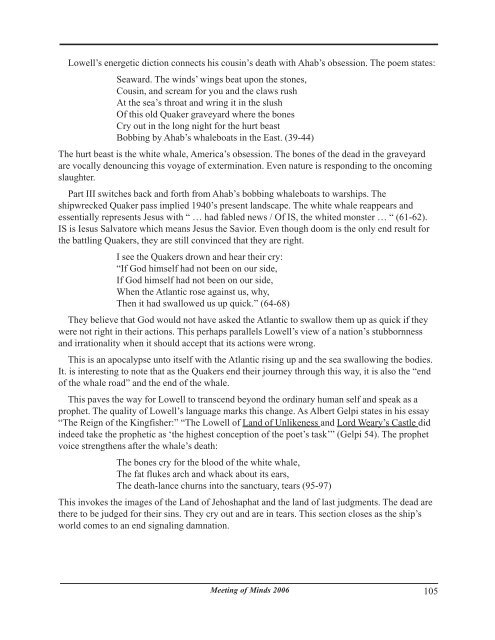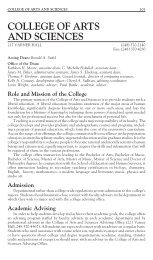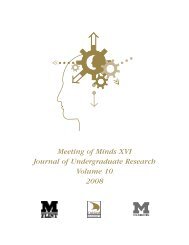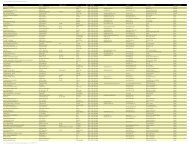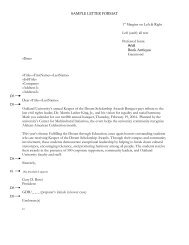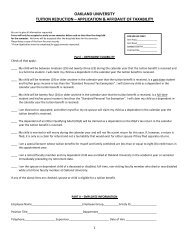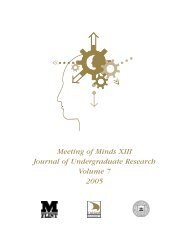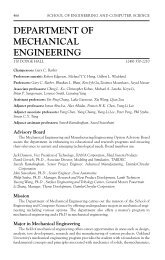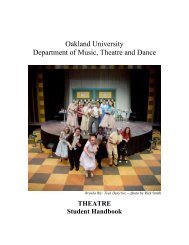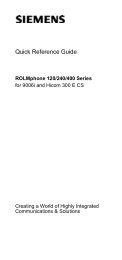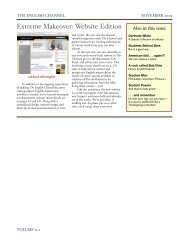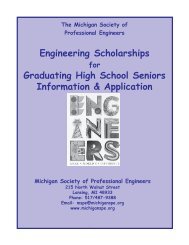MOM 2006 journal for pdf.pmd - University of Michigan-Flint
MOM 2006 journal for pdf.pmd - University of Michigan-Flint
MOM 2006 journal for pdf.pmd - University of Michigan-Flint
You also want an ePaper? Increase the reach of your titles
YUMPU automatically turns print PDFs into web optimized ePapers that Google loves.
Lowell’s energetic diction connects his cousin’s death with Ahab’s obsession. The poem states:<br />
Seaward. The winds’ wings beat upon the stones,<br />
Cousin, and scream <strong>for</strong> you and the claws rush<br />
At the sea’s throat and wring it in the slush<br />
Of this old Quaker graveyard where the bones<br />
Cry out in the long night <strong>for</strong> the hurt beast<br />
Bobbing by Ahab’s whaleboats in the East. (39-44)<br />
The hurt beast is the white whale, America’s obsession. The bones <strong>of</strong> the dead in the graveyard<br />
are vocally denouncing this voyage <strong>of</strong> extermination. Even nature is responding to the oncoming<br />
slaughter.<br />
Part III switches back and <strong>for</strong>th from Ahab’s bobbing whaleboats to warships. The<br />
shipwrecked Quaker pass implied 1940’s present landscape. The white whale reappears and<br />
essentially represents Jesus with “ … had fabled news / Of IS, the whited monster … “ (61-62).<br />
IS is Iesus Salvatore which means Jesus the Savior. Even though doom is the only end result <strong>for</strong><br />
the battling Quakers, they are still convinced that they are right.<br />
I see the Quakers drown and hear their cry:<br />
“If God himself had not been on our side,<br />
If God himself had not been on our side,<br />
When the Atlantic rose against us, why,<br />
Then it had swallowed us up quick.” (64-68)<br />
They believe that God would not have asked the Atlantic to swallow them up as quick if they<br />
were not right in their actions. This perhaps parallels Lowell’s view <strong>of</strong> a nation’s stubbornness<br />
and irrationality when it should accept that its actions were wrong.<br />
This is an apocalypse unto itself with the Atlantic rising up and the sea swallowing the bodies.<br />
It. is interesting to note that as the Quakers end their journey through this way, it is also the “end<br />
<strong>of</strong> the whale road” and the end <strong>of</strong> the whale.<br />
This paves the way <strong>for</strong> Lowell to transcend beyond the ordinary human self and speak as a<br />
prophet. The quality <strong>of</strong> Lowell’s language marks this change. As Albert Gelpi states in his essay<br />
“The Reign <strong>of</strong> the Kingfisher:” “The Lowell <strong>of</strong> Land <strong>of</strong> Unlikeness and Lord Weary’s Castle did<br />
indeed take the prophetic as ‘the highest conception <strong>of</strong> the poet’s task’” (Gelpi 54). The prophet<br />
voice strengthens after the whale’s death:<br />
The bones cry <strong>for</strong> the blood <strong>of</strong> the white whale,<br />
The fat flukes arch and whack about its ears,<br />
The death-lance churns into the sanctuary, tears (95-97)<br />
This invokes the images <strong>of</strong> the Land <strong>of</strong> Jehoshaphat and the land <strong>of</strong> last judgments. The dead are<br />
there to be judged <strong>for</strong> their sins. They cry out and are in tears. This section closes as the ship’s<br />
world comes to an end signaling damnation.<br />
Meeting <strong>of</strong> Minds <strong>2006</strong> 105


